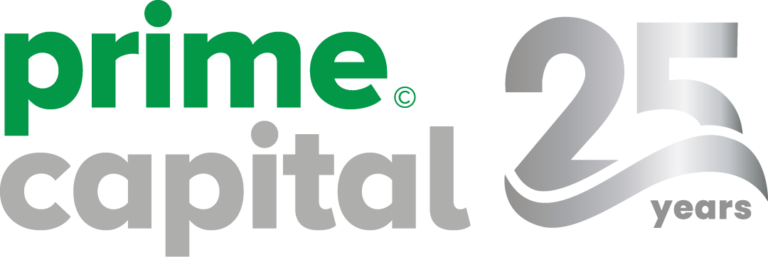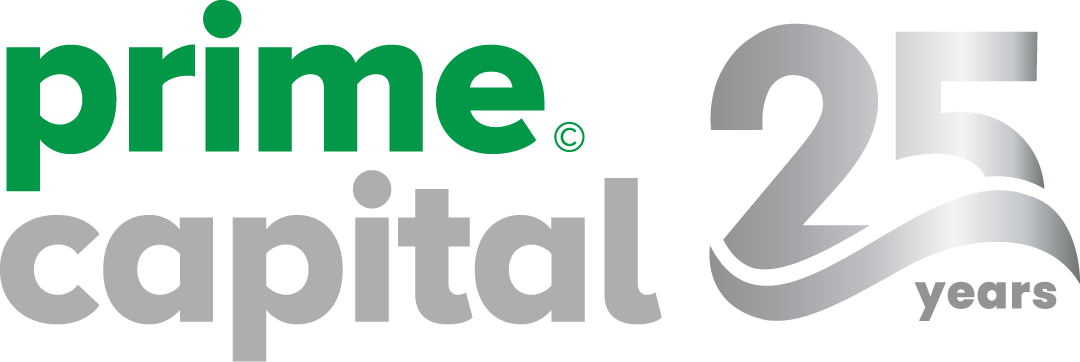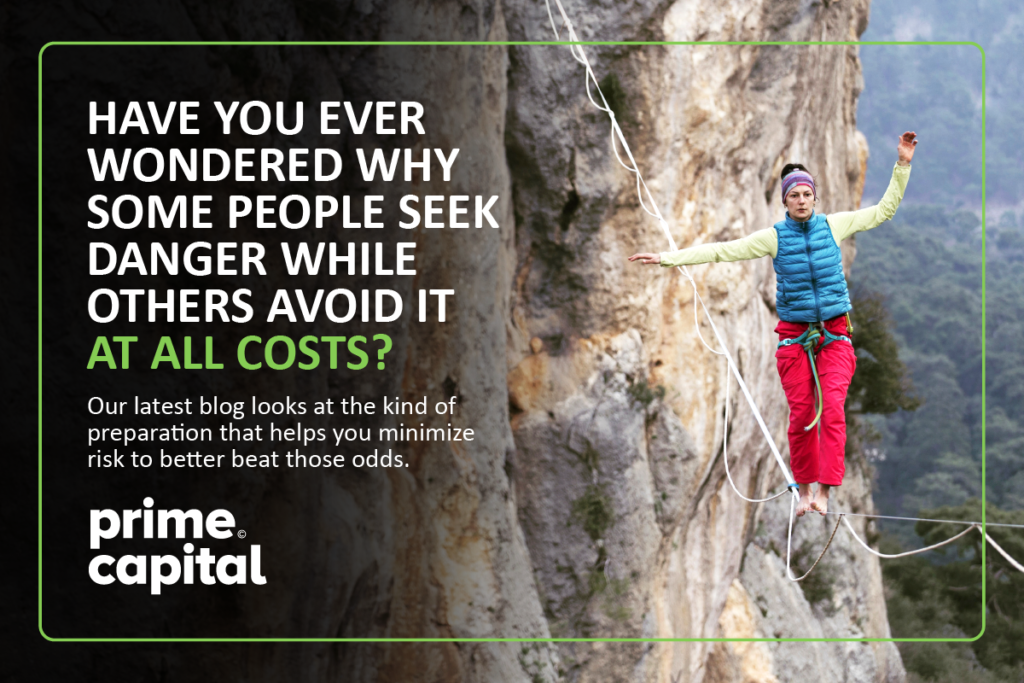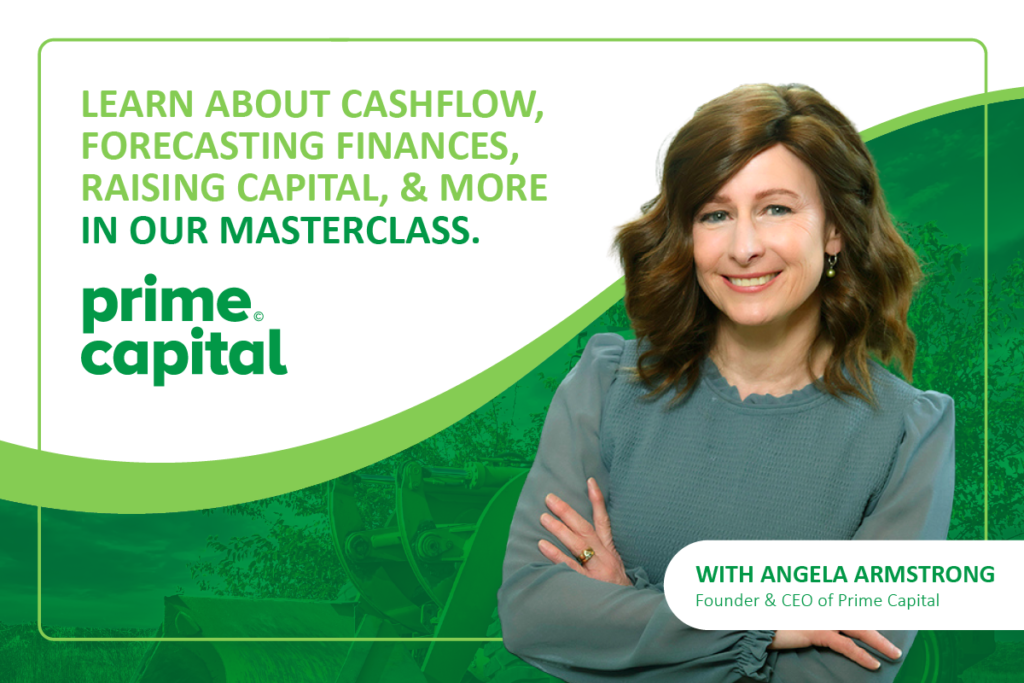Want to gamble? How about this: your paycheque against whether your business will still be here in 10 years? (Hint, you’ve got 35% odds of surviving!)
If so, you’re in the right place, and you’re far from alone.
Your odds (1 in 3 at this point) will increase *substantially* if you do these two things
- Understand the psychology that drives us, such as “Optimism Bias” (we all have this as humans, and therefore as business owners) and how it’s helpful but also like wearing blinders.
- Invest in just a little bit of time building out a few safety nets that will at least break your fall should you trip along that bold journey ahead.
Since the vast majority of our clients are entrepreneurs, we see the risky choices that are being made every day (and at Prime Capital, I have made them myself). We’re going to explore the core thing-optimism-that supports us on the road to entrepreneurship and why it’s also sometimes like wearing sunglasses at night (Corey Hart, anyone?).
Today, we scratch the surface on the topic of exchanging a steady paycheque for some uncertain future capital gain (and isn’t THAT topical right now?). We’re starting this series off with the hard questions: why do people ditch their day jobs and take a chance on starting their own businesses? Why deal with the stress of being the boss when you can just clock in and out? And what’s so appealing about a smaller paycheck now instead of hoping for a bigger raise later? Let’s dive in and answer these questions together.
Today, we examine healthy (and some unhealthy) risk management approaches that entrepreneurs take. We’ll explain why we do this and what the (unintended) consequences of wearing sunglasses at night might be for your road trip.
So, are you feeling lucky? Let’s find out!
Optimism Bias in Small Business
Denial is not a river in Egypt; it’s how humans get through life.
We believe our luck will just….hold. No matter what the facts say.
The scientific name for this is optimism bias.
Optimism bias is the belief that we are less likely to experience a setback than the “average” person. It doesn’t hurt that, let’s face it, “we” basically work harder, have more grit, better connections, and are all-around better looking than the competition (haha).
But, you say, confidence is next to godliness…..isn’t it? The good, of course, is that optimistic thinking results in confidence, which is essential in making the leap to small business ownership. The bad? This confidence can blind us to the reality of risky assumptions in our decision-making (something I learned personally and will touch on in a minute).
Confidence that acts like sunglasses at night might help you take that big leap-but if you also tend to ignore the ‘if I crash, I will spend a year in a hospital recovering’ part of the internal dialogue, that doesn’t make you a narcissist. It makes you human and probably helps you be bold as an entrepreneur. So, what are the real pitfalls, then?
Balancing Optimism and Risk
Even if you consider yourself an extraordinary driver (cue your inner Mario Andretti/Danica Patrick), statistically, car accidents do happen to average drivers (not just the reckless ones). Your low insurance rate isn’t a badge of honour for being a perfect driver; it just means you haven’t had an accident yet. By focusing on your positive to-date track record, you might end up tolerating a higher-than-average risk involved in driving.
And that accident? You simply didn’t see it coming.
Let’s apply that to starting a business. There’s a more than 2 in 3 chance that your effort will fail. Yet here we are anyway-are we willfully ignorant or blissfully optimistic?
It’s probably a bit of both.
Optimism Bias is a known human attribute that permits us to move forward, even with uncertainty. Leave the cave (can’t see any tigers), get on the plane (haven’t been in a crash yet), sign that mortgage document (I’m not going to lose my job).
It’s useful; Daniel Kahneman (noted behavioural psychologist) has said that “most of us view the world as more benign than it actually is, our own attributes as more favourable than they truly are, and the goals we adopt as more achievable than they are likely to be. We also tend to exaggerate our ability to forecast the future, which fosters overconfidence. In terms of its consequences for decisions, the optimistic bias may well be the most significant cognitive bias.”
That says a lot when there are more than 180 types of cognitive bias.
As entrepreneurs, we already see and evaluate risk differently. Entrepreneurs may focus more on the potential rewards, like the satisfaction of building something from scratch, the chance to make a difference, or the freedom of being your own boss. In other words, the rewards justify the risk. It’s certain that nothing new ever came to being without someone taking a chance – the question is whether it’s a Wright Brothers moment and you can survive the plane crash(es). Our survival is going to depend on how well we create a good landing pad and the quality of our safety apparatus. Even the best hang gliders check their gear and wear a crash helmet.
The helmet is a kind of insurance for your brain; but it doesn’t magically heal your head if you do end up in a bad situation. It’s the minimum protection you can give yourself, knowing that your head in a crash, like your bank account in a business cash flow crisis, could take an unrecoverable hit.
Insurance vs. Risk Management-Which is Better?
Pro tip: never rely on insurance as a safety net.
As a heavy equipment leasing company that handles many financial transactions, particularly in today’s digital world, we have cyber security insurance. But let’s be honest: Nobody wants to activate that insurance. While it might offer some resources to assist after a breach, it won’t magically solve the underlying problem of not addressing risk.
Think of insurance as a financial bandage for your small business, not a time machine. It can help ease the financial pain of a cyberattack, but it won’t undo the damage or erase the stress-just like a flood insurance cheque won’t replace a cherished wedding album.
The key is prevention. Insurance companies know this, and more and more, want to know what YOU are doing to protect yourself, that makes you a less risky “risk” for them. Just as you wouldn’t leave your house unlocked, prioritizing cybersecurity measures is necessary to protect your business. You knew the risks of starting your business, so now your job will be to mitigate those risks daily.
To put it in financial terms, even if leasing is a lower-risk strategy for growing your business, it must be balanced against good cash flow planning. All lenders know that if you’re not watching out for the risks, you’re probably not a good risk, and there goes your lending opportunities.
In the end, insurance is only one tool for defending yourself from the risks ahead.
If there is one takeaway here, it’s that an ounce of prevention is worth a pound of insurance. It’s not sexy and won’t win you any awards, but optimism paired with risk management is your ticket to success.
Take our FREE Masterclass on Understanding and Leveraging Cash Flow
The Lessons We Take For Granted
Tom Cruise is famous for his approach to risk and stunts in his movies. He pushes the boundaries. We know he’s backed by a well-schooled team that measures, tests, and calculates before he takes anything on, and even though that might reduce the risk, it can never eliminate it. While I may not feel like Tom Cruise most days, I certainly can relate to taking big chances when the calculations are done beforehand.
Once upon a time, my company was approached by a new client who would require a deeper call on our capital than the business had prepared for. The risk was immense-not just to our cash reserves but also to our standing in the community, with those who lent to us, and with our existing clients.
With limited time to prepare to make the call, I trusted my gut, years of experience, and the lucky stars to proceed with the deal.
The fact that I’m still around and privileged enough to write this means the gamble worked out, just as Tom Cruise is still in the game.
But it could have looked much differently, and that will be the subject of our second part on optimism and risk management. In the meantime, get in touch for tips on how strong cash flow can prevent disasters and discuss leasing for your next business-related stunt!





